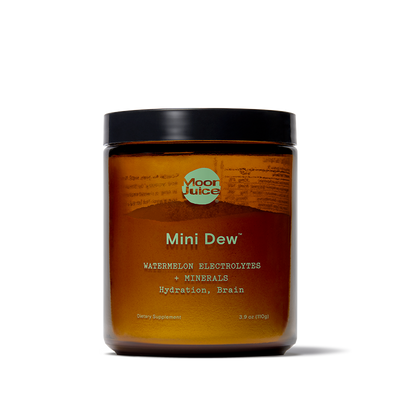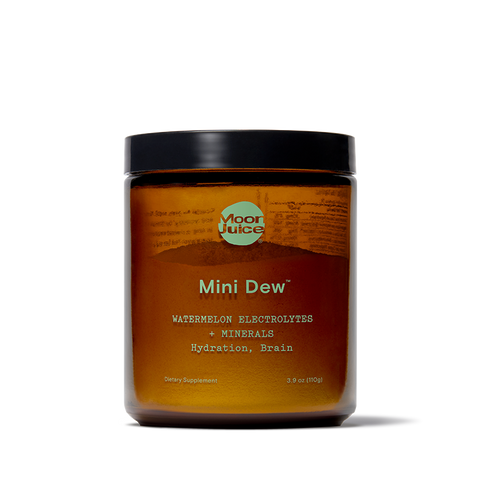Feeling more off than usual but can’t figure out why? Any number of things could be at play, like a poor night’s sleep or excess stress. On the dietary level, you could be experiencing a handful of symptoms if you’re low in certain nutrients, including micronutrients. We need vitamins and minerals only in relatively low quantities compared to fat, protein, and carbs (aka macros). However, they’re small but mighty — and can throw your physical and mental well-being for a loop if you lack them.
In this article, we’re honing in on mineral deficiencies. Discover what they are exactly and the most common mineral deficiencies and associated symptoms. Plus: pro tips to boost your levels through diet, lifestyle, and supplementation.
What Is a Mineral Deficiency?
A mineral deficiency indicates that you’re drastically lacking enough of a specific mineral, whether from low intake or if your body isn’t absorbing it well from the foods you eat. Moreover, sometimes a mineral deficiency may be no fault of your own. Even if you adhere to a plant-forward, mineral-rich diet, modern agricultural practices have significantly reduced the nutrient density in soil, resulting in less nutrient-dense crops.
It’s also worth noting that inadequacy and deficiency aren’t interchangeable terms. According to a 2022 review in the Journal of Preventive Medicine and Hygiene:
- A nutritional inadequacy is present when your intake is below the recommended daily allowance (RDA), which can vary based on factors like your age, gender, and health status.
- A nutritional deficiency is present if your levels of a given nutrient are severely reduced to the point that the body can’t perform its normal functions, thus heightening the risk of adverse symptoms and more serious illness in the long term.
Micronutrients — that is, both vitamins and minerals — are imperative to facilitate nearly all developmental and metabolic processes in the body. Per a review in the journal Proceedings of the National Academy of Sciences (PNAS), a micronutrient deficiency in the body can cause DNA damage and mitochondrial decay, ultimately fueling accelerating aging from the cellular level and increasing the risk of disease.
In short, you definitely want to get on top of a micronutrient deficiency as soon as possible. One way to do so is to be privy to the warning signs of mineral deficiency.
Symptoms of a Mineral Deficiency
Symptoms of mineral deficiency can be unique to a single mineral at hand. Generally speaking, though, you might get the tip-off that a nutritional deficiency is present if you experience:
- Fatigue
- Weakness
- Digestive distress
- Nausea
- Irregular heartbeat
- Muscle cramps
- Numbness or tingling
- Cold hands or feet
- Difficulty concentrating
- Poor immune function
Not all mineral deficiencies will have immediate, notable symptoms, so it’s just as crucial to stay on schedule with your routine medical check-ups.
Common Types of Mineral Deficiencies
Iron Deficiency
As the American Society of Hematology recaps, Iron is necessary to facilitate many of the body’s functions. One of its most important duties is to produce hemoglobin, a molecule in the blood that carries oxygen.
Iron deficiency can lead to anemia, a condition in which there aren’t enough healthy red blood cells to hold and transport oxygen to the body’s tissues. Symptoms of Iron deficiency include:
- Fatigue
- Weakness
- Shortness of breath
- Headache
- Rapid heartbeat
- Pale or sallow skin
- Brittle nails
- Hair loss
Iron deficiency is amongst the most common mineral deficiencies, particularly in:
- Women who menstruate (especially with heavy flows)
- Prepartum, postpartum, and lactating women
- People with GI disorders
- People who follow plant-based diets (as animal sources of Iron are more bioavailable than plant sources)
Calcium Deficiency
Famously important for the integrity of bones, teeth, and tissues, Calcium is the most abundant mineral in the body.
According to the Cleveland Clinic, the primary symptoms of Calcium deficiency include:
- Fatigue
- Tooth decay and loosening
- Muscle aches, pains, spasms, and stiffness
- Numb and tingling fingers
- Abnormal heartbeat
These signs can be subtle, especially in the beginning stages of deficiency. Moreover, Calcium deficiency can be hard to detect through routine blood work since your body will take your Calcium supply from the bones as needed. If you know you don’t get enough Calcium through food sources, discuss your concerns with your physician to see how you can improve your nutrient intake or take a mineral supplement. In the long run, proactivity will help reduce your risk for low bone mass and osteoporosis.
Those most at risk for Calcium deficiency include postmenopausal women and people who don’t consume dairy products, says the National Institutes of Health (NIH).
Magnesium Deficiency
Magnesium is involved in over 300 biochemical reactions. The mineral is involved in everything from sleep and mood to cognitive function and bowel regularity.
The primary warning signs of Magnesium deficiency include:
- Muscle cramps
- PMS
- Insomnia
- Constipation
- Mood imbalances
- Decreased bone density
- Headaches
- Brain fog
- High blood pressure
- Fatigue
- Blood sugar imbalances
You may be at risk of developing a Magnesium deficiency if you:
- Have a digestive disorder
- Have type 2 diabetes
- Have kidney problems
- Consume excess alcohol
- Don’t boost Magnesium intake while pregnant or breastfeeding
- Experience chronic stress
Potassium Deficiency
Potassium is important for all of the body’s functions, including maintaining proper function of the muscles, nerves, and heart. It also promotes healthy digestion and bone strength.
Some people might not experience symptoms of Potassium deficiency, but those who do may know that it’s present if they experience:
- Fatigue
- Constipation
- Muscle weakness
- Muscle cramps
- Abnormal heart rhythm
Potassium deficiency is associated with:
- Dehydration
- Kidney disease
- Issues with the endocrine system or metabolism
- Low Magnesium levels
Zinc Deficiency
Zinc is an essential trace mineral whose responsibilities range from bolstering the immune system against pathogens, assisting wound healing, making DNA, and contributing to the sense of taste. On the dermatology front, it’s also beneficial for keeping breakouts and rosacea at bay.
According to Harvard Health, Zinc deficiency most often manifests due to poor absorption of Zinc (rather than dietary gaps alone), which can lead to symptoms such as:
- Poor appetite
- Mood imbalances
- Poor immune function
- Poor wound healing
- Diarrhea
- Hair loss
- Loss of taste or smell
People at risk for zinc deficiency include:
- Pregnant and lactating women who don’t boost their intake
- People who follow plant-based diets (as animal sources of Zinc are more bioavailable than plant sources)
- People with digestive disorders or chronic diarrhea
- People with liver or kidney disease
- People with sepsis
Copper Deficiency
Copper might not be the most popular trace mineral, but it’s involved in tasks as diverse as making red blood cells (and helping the body absorb Iron), supporting immune function, and forming collagen. According to the Icahn School of Medicine at Mount Sinai, Copper may also have antioxidant capabilities, thus helping to stave off free radicals that spur cell damage and accelerated aging.
You may have a Copper deficiency if you have:
- Low body temperature
- Bone fractures
- Irregular heartbeat
- Thyroid issues
- Loss of skin pigmentation
- Anemia (i.e., an Iron deficiency)
Per the NIH, people at risk for Copper deficiency include those:
- With celiac disease
- Who take high-dose Zinc supplements (as Zinc inhibits Copper absorption)

How to Fix a Mineral Deficiency
Since different mineral deficiencies can manifest in different symptoms, it’s important to figure out the specific mineral you’re lacking to begin with with the help of your medical team. From there, you can come up with an action plan to strategically boost your nutrient intake and reach your RDA for optimal health benefits.
Dietary Changes and Nutrition
If you’re not getting enough of a specific mineral, it makes sense that you’ll want to add more of these mineral-rich foods to your diet. But sometimes, things get a bit more nuanced.
For instance, those with an Iron deficiency may want to increase their dietary intake of heme Iron: a type that the body can more easily absorb. However, it only exists in animal foods like meat, poultry, and seafood. If you follow a plant-based diet, you can still get this mineral in your diet via non-heme Iron. It’s harder for your body to absorb, and thus, you’ll need to consume it in higher quantities than you would heme Iron — but when there’s a will, there’s a way. Good sources of plant-based Iron include dark leafy greens, beans, lentils, chickpeas, tofu, nuts, seeds, and dried fruit — the majority of which will also pack a smattering of other essential minerals.
Similarly, there are different types of Magnesium that vary in bioavailability. The most bioavailable forms of Magnesium include:
- Magnesium Citrate
- Magnesium Glycinate
- Magnesium Gluconate
- Magnesium Acetyl Taurinate
- Magnesium Chloride
- Magnesium Malate
You can’t really go wrong by hacking your diet and loading more healthy, mineral-rich foods and drinks. Yet sometimes this can only help to an extent, and in some cases, a high-quality mineral supplement comes in handy
Lifestyle Modifications and Preventative Measures
In most cases, you’ll need to address a mineral deficiency through dietary intake and medical interventions. However, you’ll always do right by your body and overall health by living a healthy lifestyle — such as managing stress, exercising regularly, and sleeping well — to improve your health outcomes across the board.
Proactivity is an ideal form of prevention for most health concerns, including mineral deficiency. That said, if you experience any mineral deficiency symptoms outlined above, address them at the onset before they potentially evolve into a bigger issue. And since some mineral deficiencies can be asymptomatic or take a while to show signs, staying on top of routine medical check-ups can help you spot abnormalities in their tracks.
Supplements
Of course, it’s always best to consult your physician if you experience any of the signs of mineral deficiency outlined above. Yet as an insurance policy of sorts — whether the symptoms look familiar, you sweat a lot, and/or experience dehydration often — supplementing with an electrolyte drink powder can help you make progress on replenishing your mineral counts. (As a literal and figurative refresher, electrolytes are essential minerals that carry an electric charge.)
Mini Dew™ is a 2-in-1 solution to cover your bases for both electrolytes and trace minerals— including nearly all of the minerals discussed thus far that are commonly linked to deficiencies. Plus, it’s an easy and delicious way to add minerals to water on the go!
Altogether, this bioavailable electrolyte powder mix allows the brain and body to thrive by helping to:
- Support optimal hydration via water balance in and around cells*
- Enhance memory and cognitive performance*
- Reduce brain fog and mental fatigue*
- Reduce PMS cramps as well as normalize sex hormones in perimenopausal women*
- Support collagen and elastin synthesis for skin and hair benefits*
If you have a mineral deficiency and need to up your intake of electrolytes and trace minerals, shop Mini Dew™ today!
Sources
- https://www.ncbi.nlm.nih.gov/pmc/articles/PMC9710417/
- https://pubmed.ncbi.nlm.nih.gov/17101959/
- https://www.hematology.org/education/patients/anemia/iron-deficiency
- https://health.clevelandclinic.org/are-there-any-telltale-signs-that-youre-not-getting-enough-calcium
- https://ods.od.nih.gov/factsheets/Calcium-HealthProfessional/
- https://www.healthdirect.gov.au/magnesium-deficiency
- https://www.aarp.org/health/conditions-treatments/info-2023/nutrient-vitamin-deficiency-symptoms.html
- https://www.healthdirect.gov.au/potassium-deficiency
- https://ods.od.nih.gov/factsheets/Zinc-Consumer/
- https://www.ncbi.nlm.nih.gov/pmc/articles/PMC4120804/
- https://www.hsph.harvard.edu/nutritionsource/zinc/
- https://www.mountsinai.org/health-library/supplement/copper
- https://ods.od.nih.gov/factsheets/Copper-HealthProfessional/
- https://www.healthdirect.gov.au/foods-high-in-iron














